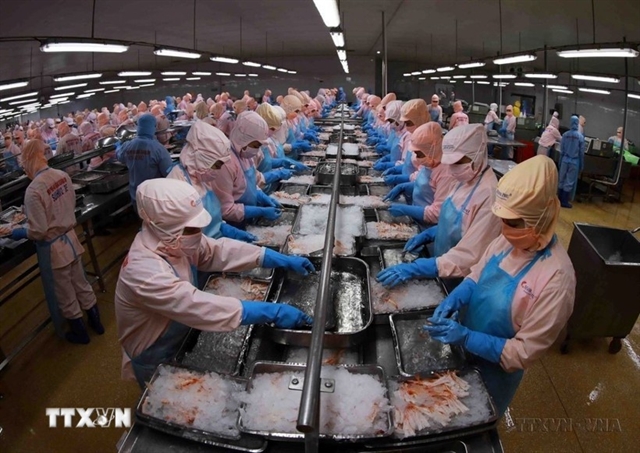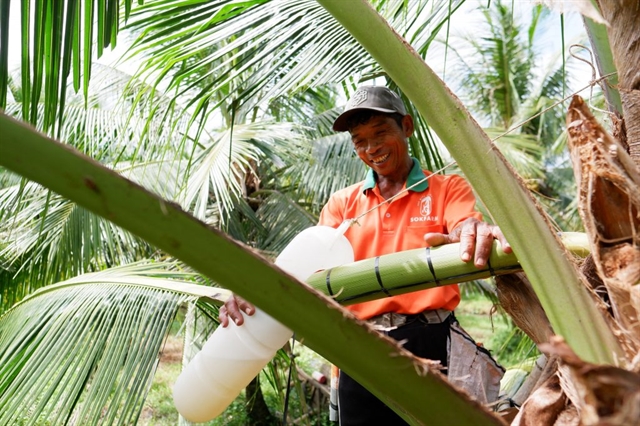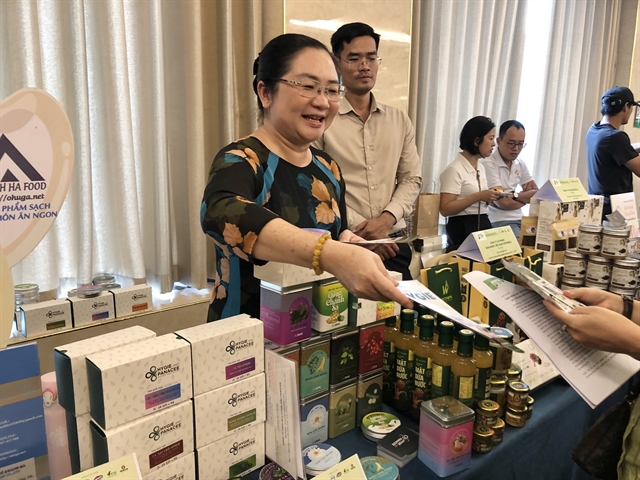 Economy
Economy


|
| A Sokfarm worker climbs up a coconut tree to collect syrup. — Photo courtesy of Sokfarm |
HCM CITY — Young couple Thạch Thị Chal Thi and Phạm Đình Ngãi, whose start-up Sokfarm Co. Ltd. makes coconut flower nectar and other products and exports to many countries, have opened a new direction for farmers in the Cửu Long Delta amid worsening saltwater intrusion into rivers.
In 2019 Thi, who has a master’s degree in food technology, and Ngãi, an electrical engineer, decided to leave HCM City for Trà Vinh and launch an enterprise whose name reflectes their dream: Sokfarm means “happy farm” in Khmer, Thi’s mother tongue.
The idea of establishing the company came in early 2018 when the price of dried coconut dropped dramatically in the province and saltwater intrusion began to significantly affect livelihoods and agriculture in general in the delta.
Ngãi, who is also Sokfarm CEO, says collecting coconut blossoms is a traditional profession among the Khmer ethnic people in Trà Vinh.
After choosing a coconut tree three to 10 years old, workers must climb it at least twice a day to massage flowers that are about to bloom and collect syrup from them for processing. Sokfarm uses vacuum concentration technology to cook the syrup at a low temperature of 55-60 degrees Celsius to retain the nutrients, colour and taste.
Ngãi said Sokfarm has a 20ha coconut farm with international organic certificates and a 500sq.m factory with an ISO 22000: 2018 certificate for food safety management. It employs 38 workers and has tied up with 35 farmers in the province’s Tiểu Cần District.
Farmers’ income from syrup is three to five times that from coconuts, Ngãi said.
The company currently has seven products from coconut - nectar, flower vinegar, sugar, fresh blossom water, cider vinegar, cocoa nib and coconut nectar, and flower aminos - with a monthly output of 10-15 tonnes.
Ninety per cent of the products are sold in the domestic market and 10 per cent are exported to Japan, the Netherlands and Germany, he said.
“Globally, there is great demand for new sweeteners that have low glycemic index or rich in minerals, or can solve problems that old sweeteners cannot.
“And coconut flower nectar is a perfect product to meet that demand.”
Coconut flower nectar has a sweet taste, lower glycemic index than honey or cane sugar and high mineral content, making it suitable for vegans, people suffering from diabetes, and seniors.
“With more consumers embracing healthy lifestyles, the market for products using natural ingredients such as coconut flower nectar will expand in future.”
Trà Vinh is the country’s second largest coconut growing province, and also one of the hardest hit by climate change in the delta, he said.
“Coconut trees are highly adaptive to climate change, can withstand salinity levels of 0.5 per cent, and still flower when the salinity level reaches 1.5 per cent though their fruits will drop off or be smaller, meaning earnings will be reduced.
“Shifting to planting coconut for collecting syrup will help farmers increase their income by three to five times compared to fruits.
“The conversion will be a new direction for farmers in the Mekong Delta to adapt to climate change.”
Another start-up that has created a great impact produces instant herbal teas made from the condensed extracts of medicinal plants, which offer great health benefits and help improve the value of local products.

|
| Đoàn Thị Hồng Thắm, founder of Hygie and Panacee, introduces her instant herbal teas to visitors on the sidelines of a seminar held recently in HCM City. — VNS Photo Xuân Hương |
It belongs to pharmacist Đoàn Thị Hồng Thắm, who decided to quit her high-paying job to found Hygie and Panacee Company in 2019.
Thắm said: “As a pharmacist with many years of experience in research and production of medicinal herbs, I realise that the Mekong Delta is an extremely abundant source of raw agricultural materials, and each type of agricultural product has medicinal values and have been used for long as folk medicine and recognised in traditional medicine.”
For instance, traditional medicines made from ginger help combat motion sickness and dizziness and treat nausea in pregnant women. Fish mint is very good for treating haemorrhoids, constipation and varicose veins, while perilla helps treat colds, nausea and vomiting associated with pregnancy and gout, she said.
“These medicinal values in agricultural products are very precious but have not been exploited to the fullest extent, and so I want to make a change to enhance the value of Vietnamese agricultural products and create quality healthcare products.”
Her company has developed 12 types of instant herbal teas made from common agricultural products such as ming aralia, perilla, ginger, lemongrass, and others and its production systems meet ISO 22000:2018 standards.
It has tied up with co-operatives that produce clean vegetables in Cần Thơ to ensure a steady supply of raw materials. Sales have grown steadily in recent years, and in addition to increased consumption in the domestic market, it has also strived to promote exports to more markets, she said.
Nguyễn Lâm Viên, chairman of Vinamit JSC, which has supported the Innovation Start-up Project Contest (name changed to Green Start-up Project Contest in 2023) for many years, said Việt Nam's agricultural products are increasingly recognised by the world as reflected by their steadily increasing exports.
Consumers globally are paying more attention to healthy and environment-friendly agricultural products, which offer young entrepreneurs a great opportunity if they know how to take advantage, he said.
Evaluating agricultural start-ups set up recently, Vũ Kim Anh, deputy director of the Business Study and Assistance Centre and the person in charge of the Green Start-up Project Contest, said: “Most of the projects know how to utilise indigenous resources and technologies for processing products to increase their value.
“Many start-ups have exported products such as vegetable powders, noodles, coconut flower nectar, and cashew-based products to major markets such as the US, Europe and Southeast Asia.” — VNS




